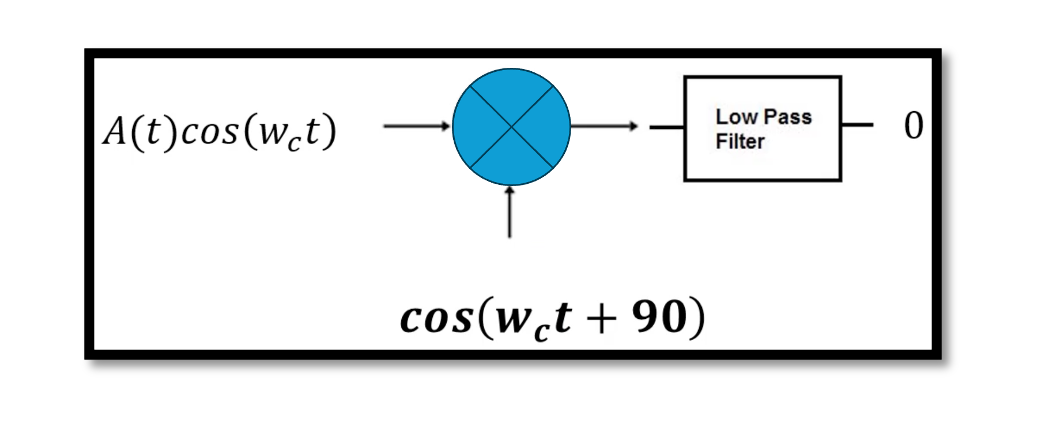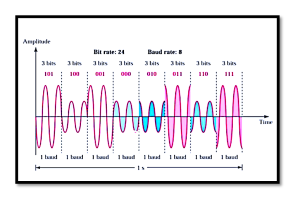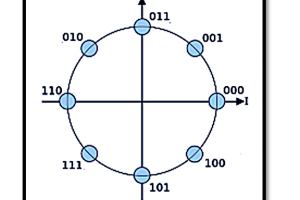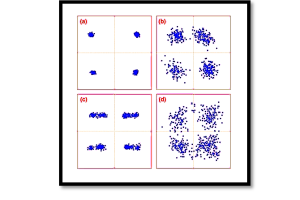
Understanding PSK Demodulation and Its Challenges
Introduction to PSK Demodulation
Phase Shift Keying (PSK) is a digital modulation technique where the phase of a carrier signal is varied in accordance with the binary data. PSK is widely used in modern communication systems due to its bandwidth efficiency and resilience to noise. However, demodulating a PSK signal at the receiver requires precise synchronization between the modulated signal and the carrier signal.

Components of a Simple PSK Demodulator
A basic PSK demodulator consists of the following:
- Multiplier (Mixer): The incoming modulated signal is multiplied with a reference carrier signal.
- Low-Pass Filter: The mixed signal is filtered to extract the baseband signal containing the binary data.
The demodulator assumes that the received signal, A(t)cos(ωct), is perfectly synchronized with the carrier, cos(ωct). The multiplication results in:

After passing through the low-pass filter, the high-frequency component cos(2ωct) is eliminated, leaving the desired baseband signal A(t), which corresponds to the binary data.
The Core Problem
In real-world scenarios, achieving perfect synchronization between the transmitted and received signals is challenging due to:
- Carrier Recovery: The receiver is typically remote and lacks direct access to the unmodulated carrier.
- Phase and Frequency Matching: The reconstructed carrier at the receiver must match the original carrier in both frequency and phase.
If the carrier’s phase or frequency is mismatched, the demodulation process fails, leading to significant errors.
Mismatch in Carrier Synchronization
A mismatch in the phase of the carrier leads to demodulation errors. For example, if the reference carrier at the receiver is cos(ωct+ϕ), the multiplication produces:

The mismatch problem emphasizes the need for a precise carrier recovery mechanism to ensure correct demodulation.

The Costas Loop: A Solution to Carrier Recovery
The Costas Loop is a robust technique for demodulating PSK signals while simultaneously recovering the carrier. It offers significant advantages over feed-forward methods, especially in noisy environments. The Costas Loop comprises:
- Phase Detector: Compares the incoming signal with the internally generated carrier to estimate the phase error.
- Voltage-Controlled Oscillator (VCO): Adjusts the frequency and phase of the carrier based on the phase error.
- Loop Filter: Smoothens the phase error signal to stabilize the VCO.
The iterative process allows the Costas Loop to converge to the correct carrier phase and frequency, ensuring accurate demodulation.

Advantages of the Costas Loop
- Noise Resilience: Superior performance in rejecting noise compared to other techniques.
- Simultaneous Demodulation and Carrier Recovery: Eliminates the need for separate processes.
- Flexibility: Effective for various PSK schemes, including BPSK and QPSK.
Take our entry level course (Below) for free using coupon code RAHRF101BLOG
RF Fundamentals, Basic Concepts and Components – RAHRF101
For limited time take an additional 10% off of all our courses using coupon code RFCERT10
Rahsoft RF Certificate and courses
Conclusion
PSK demodulation is critical in modern communication systems but is fraught with challenges due to carrier synchronization issues. Mismatched carriers result in significant demodulation errors, highlighting the importance of robust carrier recovery mechanisms like the Costas Loop. By iteratively aligning the carrier in phase and frequency, the Costas Loop ensures reliable communication even in noisy environments. Understanding the principles and challenges of PSK demodulation is essential for designing efficient communication systems that meet the demands of modern data transmission.

Learn more about this topic by taking the complete course ‘Introduction to Modulation in Communication Systems Online Course – RAHRF152’. Watch the course videos for more detailed understanding. Also checkout other courses on RF system and IC design on https://rahsoft.com/courses/. Rahsoft also provides a certificate on Radio Frequency. All the courses offer step by step approach.
Tag:Costas loop, demodulation, Demodulator, mismatch, PSK



